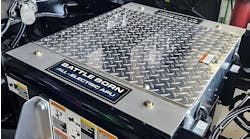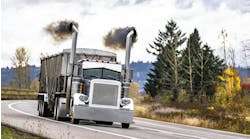A lawsuit challenging the Obama Administration’s greenhouse gas emissions standards for heavy- and medium-duty trucks was filed Tuesday by the Pacific Legal Foundation (PLF) on behalf of small businesses and trade organizations whose members the foundation claims would be damaged by the regulations.
The suit charges that federal officials were legally required to submit the regulations for independent scientific scrutiny, but failed to do so.
In the lawsuit, PLF represents the California Dump Truck Owners Assn., Southern California Contractors Assn., Dalton Trucking, of Fontana, CA, and Delta Construction Co. of Sacramento. The lawsuit is filed as a petition for review with the U.S. Court of Appeals for the District of Columbia Circuit.
(See more on truck fuel efficiency)
The regulations are the first-ever federal restrictions on greenhouse gas emissions from medium- and heavy-duty vehicles (such as trucks, tractor-trailers, and RVs). They were promulgated jointly by the Environmental Protection Agency (EPA) and the National Highway Transportation and Safety Administration (NHTSA), and were published in the Federal Register on Sept. 15, 2011.
The rules’ negative impact on the economy could be significant, PFL claimed, pointing out that the EPA and NHTSA “themselves admit that from 2014 through 2017, the proposed emissions restrictions will substantially increase costs for everyone involved in transporting goods or people on the nation’s highways, including trucking companies, independent truckers, construction companies, and others.”
The foundation said it submitted comments on the proposed regulations to EPA on behalf of a number of small businesses and trade associations that would be adversely affected.
“Those comments were essentially ignored by EPA,” the foundation claimed in the suit.
PFL said the rules are an attempt by government to “micromanage” truck design.
“The rules mandate that heavy-duty vehicles increase fuel efficiency while decreasing CO2 emissions, thereby requiring the use of new types of fuels and engines, which in turn will require aerodynamic redesign,” PLF senior staff attorney Ted Hadzi-Antich said. “The regulatory requirements will necessarily involve EPA and NHTSA in the redesign of the vehicles because the aerodynamics have a major impact on the amount of work the vehicles can perform to transport freight at common highway speeds. Thus, the federal government now wants to dictate the actual design of trucks, tractors, and other heavy-duty vehicles used throughout the economy.”
For small businesses, it’s an “impossible” price tag, he added.
“My business has already been crushed by the dismal economy and merciless regulatory climate in California,” Norman R. “Skip” Brown, owner of Delta Construction, said. “With these regulations in place, my four heavy-duty vehicles could be declared obsolete, and there will be no hope my employees could get back to work. Modifying or purchasing new equipment in today’s economy is financially impossible. This equipment will be eliminated, along with the employees. I am grateful that Pacific Legal Foundation is sticking with us to bring this case to the attention of the Court of Appeals, in light of EPA’s refusal to take our comments on the proposed regulations seriously.”
“EPA is dictating onerous new rules for vehicle manufacturers while violating important legal rules itself,” Hadzi-Antich said. “Federal law says EPA can’t issue new clean-air regulations without submitting the proposals for independent scrutiny by its Science Advisory Board. EPA recklessly ignored this requirement. We’re suing because federal regulators can’t be allowed to thumb their noses at legal safeguards that are designed to ensure that new regulations are credible and well-considered. When EPA acts like a scoflaw, it has to be called to account.”
The Science Advisory Board is a panel of top scientists from universities, research institutions, and other highly regarded organizations, empowered by federal law to review any new “criteria document, standard, limitation, or regulation” that EPA proposes to issue under the Clean Air Act, according to PLF.
“EPA rushed these rules through in order to impose comprehensive controls on carbon dioxide emissions as quickly as possible,” Hadzi-Antich said. “They literally broke the law in their haste. Their refusal to submit the rules to independent scrutiny is especially troubling because these regulations would have a huge impact on the industry and the economy. They’ll bring unprecedented federal intrusion into the manufacturing and use of medium- and heavy-duty vehicles. They would add many thousands of dollars to the costs of new vehicles.”
Pacific Legal Foundation describes itself as a donor-supported watchdog organization that “litigates for limited government, property rights, free enterprise, and a balanced approach to environmental regulations, in courts across the country.”


